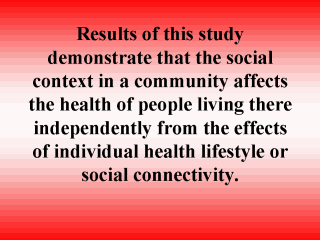 |
The structural
conditions in Moscow which significantly increased the vulnerability of specific social
groups for poor physical health were identified in a hierarchical linear regression:
relative social inequality in the form of income inequality; urban area poverty risks; and
mean level of alcohol consumption in urban areas. The psychosocial conditions included
poor diet, lack of social cohesion and social support, involvement in formal social
networks in the form of professional groups. A multilevel theoretical perspective is
important for defining the targets of preventive health policy by identifying the
structural conditions which increase the health disadvantage of some social groups.
Further research is needed in refining the concept of relative social inequality, as well
as investigating whether psychosocial factors, such as social cohesion, are mediating
links between societies and their citizens. |
